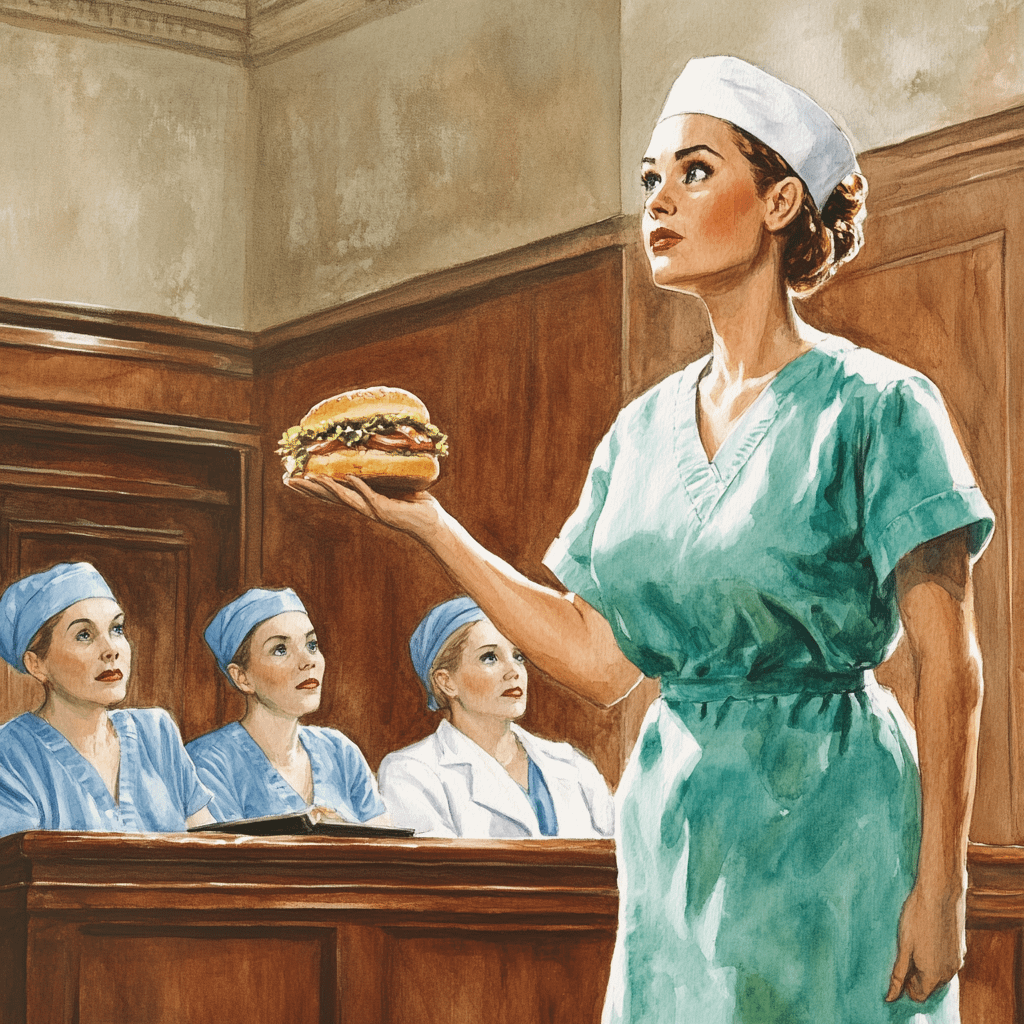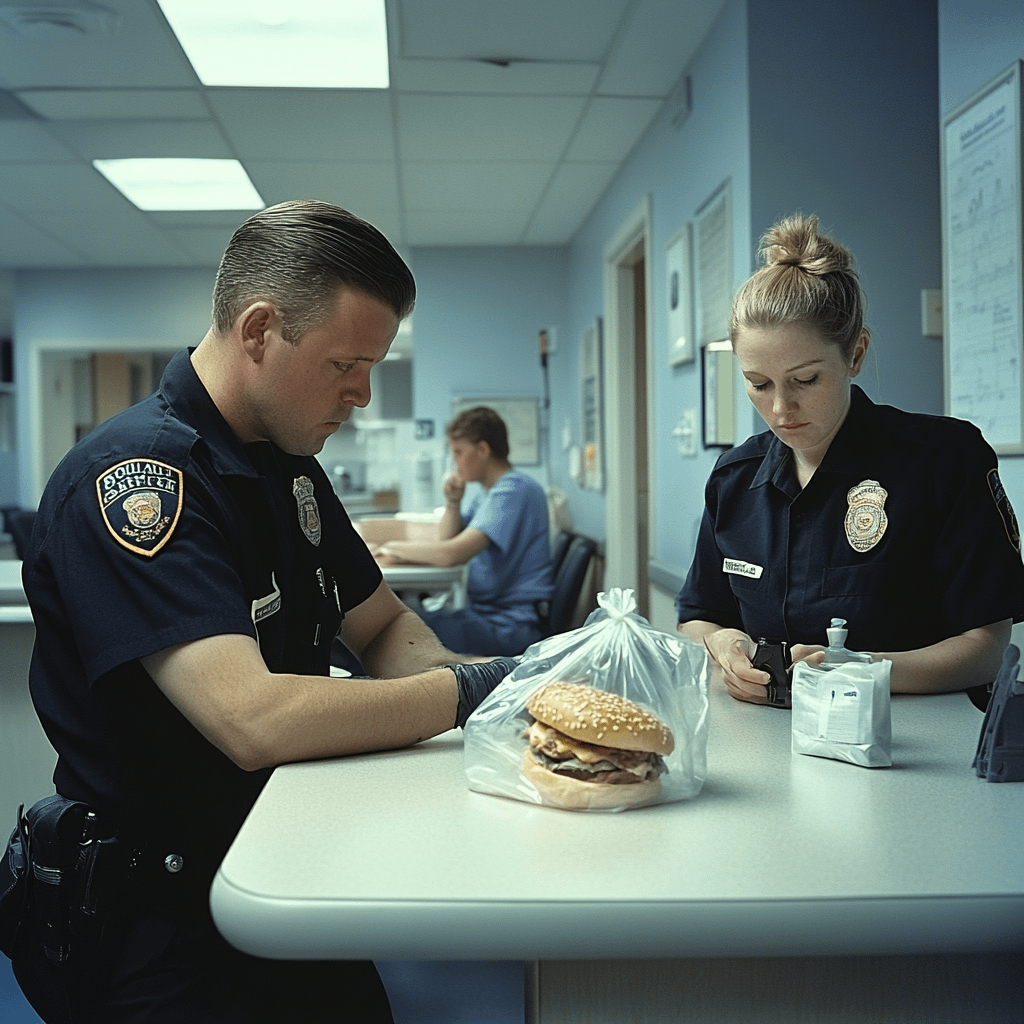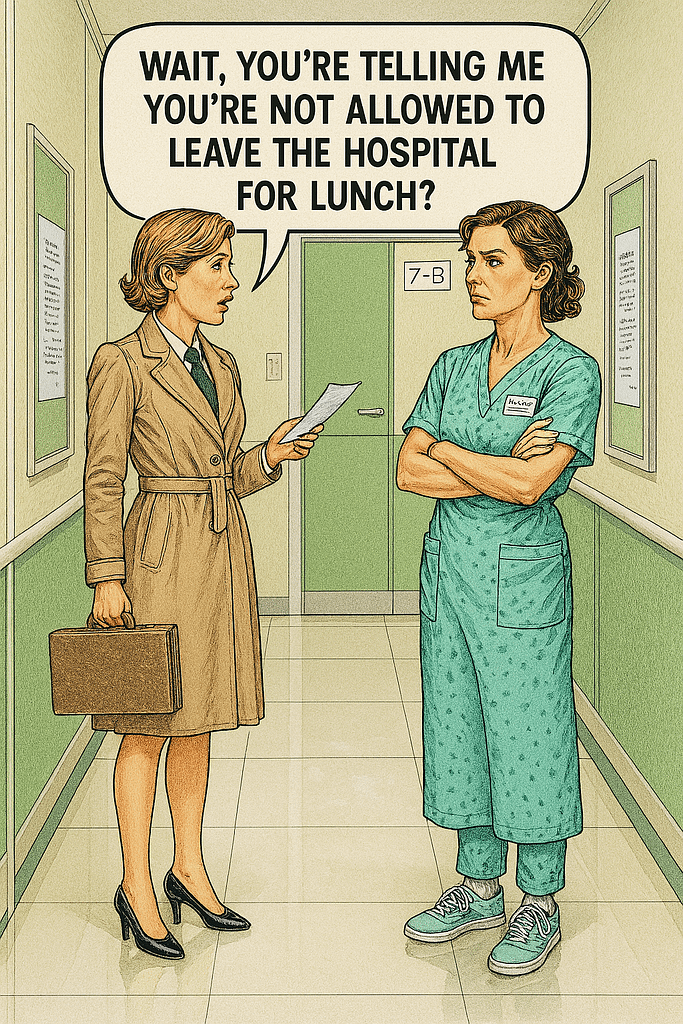They say no good deed goes unpunished. I say no lunch break goes unnoticed. Especially when it’s exactly 15 minutes long, taken between two codes and three passive-aggressive glares from management.
I didn’t storm out. I tiptoed, tray in hand, like a fugitive of basic human rights. One sandwich. One breath of silence. One lawsuit later.
Because apparently, in this hospital, eating is an act of rebellion. And God forbid you chew without charting.
Table of Contents
It started like every other shift: a little behind, a little understaffed, and a lot of caffeine. Somewhere between chasing vitals and pretending to care about emails, my stomach made a sound that could’ve passed for a pager alarm. That’s when I made the mistake—the career-ending, code-of-conduct-shattering move:
I took a lunch break.
Fifteen minutes. That’s all. Just me, a sad sandwich, and a folding chair in a closet they generously called a lounge. No music, no phone, just the eerie sound of my own chewing. It was the quietest part of my entire shift.
And apparently, the most controversial.

If you think lunch break is wild, wait ‘til you hear what night shift says out loud. (The Night Shift Said WHAT?!). And if you’re still planning to survive your next night shift with dignity intact, good luck — you’ll need this instead. (How to Survive Night Shift)
The Trial of the Century (Over a Sandwich)
The courtroom smelled like printer paper and missed breaks. My badge was still clipped on. My hair had been up for 16 hours and gravity was giving up. The charge nurse sat in the front row with a clipboard and a smirk. I adjusted my scrubs, nodded at the jury (all overworked nurses), and braced for war.
Prosecution: “Let’s begin with Exhibit A: a ham sandwich.”
Me: “It was turkey.”
Prosecution: “Does it matter?”
Me: “To the sandwich, yes.”
Prosecution: “At 13:08, you vacated the unit, correct?”
Me: “I didn’t ‘vacate.’ I stealth walked to the break room like a raccoon fleeing daylight.”
Prosecution: “And what were you doing in the break room?”
Me: “Sitting. Chewing. Regretting.”
Prosecution: “During this… ‘chewing’… were you aware that Room 12 asked for their pain meds three whole times?”
Me: “I was aware they also asked for a fifth sandwich, a priest, and to speak to Obama.”
Judge: leans forward “Do we have Obama on call?”
Prosecution: “Let’s talk about the labs. A potassium of 2.9 was missed.”
Me: “So was my will to live.”
Prosecution: “Were you… laughing during your break?”
Me: “Briefly. It was a nervous system glitch.”
Prosecution: “And you wrote, and I quote, ‘Finally eating something that isn’t rage.’ Explain.”
Me: “That’s an accurate nursing note.”
Jury: A med-surg nurse wipes away a tear of laughter
Prosecution: “No further questions. I need a nap.”
Judge: “Verdict?”
Jury Foreperson (an ED nurse): “We find the defendant… tragically relatable. And also guilty of eating the last cookie in the break room.”
Judge: “Sentence: eight back-to-back shifts and a mandatory 2-hour PowerPoint on hydration.”
Me: “Can I get my sandwich back?”
Bailiff: eating it slowly, staring dead in my eyes “No.”
The Moment of Rebellion
It all started with a noise—my stomach.
It growled so loud, a med student dropped a pen. The intern next to me whispered, “Was that a code?”
No, sweet child. That was hunger. And I had had enough.
I looked around. The world slowed. The fluorescent lights flickered. Somewhere in the distance, a baby cried. The nurse’s station printer jammed. A manager tilted their head like they sensed a disturbance in the Force.
And I rose.
Not dramatically—more like a sore, compressed spring uncoiling after 9 hours of restraint and caffeine. I waddled toward the break room like a wounded raccoon with a grudge and a granola bar.
The room greeted me like an abandoned bunker. The air was thick with disappointment and someone’s forgotten Lean Cuisine. I sat on a chair that had seen things. I peeled open my sandwich like it was contraband. I took a bite—and for one glorious second, I tasted hope.
That’s when the unit fell apart.
Call lights exploded. Patients remembered they had pain. The IV machine declared war. A doctor called and asked for all the labs. A printer caught fire.
By the time I returned 12.5 minutes later, the unit had written my obituary. The charge nurse wouldn’t look me in the eyes. The orderly whispered “traitor” under her breath. A sticky note on my computer said “nice of you to rejoin us.”
Apparently, my crime wasn’t abandoning patients.
It was chewing in peace.

Let’s be honest: nobody’s warming your food for you. Not the hospital microwave (which is either radioactive or missing), not your colleagues (who took lunch break three hours ago), and definitely not the universe. Enter: a portable electric lunch box that doesn’t judge you for reheating the same rice and regret for the third day in a row.
When Management Hears You Chewed Without Clearance
It started with a ping.
Not from a monitor, not from a patient—but from the group chat.
A single message from management:
“Hey team, can we talk about lunch break coverage?”
Ah yes. Nothing sends a chill down your spine like corporate concern disguised as a lowercase sentence.
I had barely wiped the crumbs off my face when it began.
First, the side-eyes.
The subtle “oh you took a lunch break?” glance from someone already deep into their third hallway wander.
Then came the clipboard shuffle—the admin mating call.
Suddenly, everyone had questions.
“Were you gone for fifteen whole minutes?”
“Who was watching Room 14?”
“Did anyone authorize this… chewing?”
“Did you clock it? Because if you didn’t clock it, it didn’t exist.”
And my personal favorite:
“Can we just chat really quick?”
Spoiler alert: we never “just chat.”
We debrief. We review policy. We reflect on our commitment to the team—all while standing in a hallway that smells like sterile disappointment and beef stew.
They didn’t say I was wrong.
They just asked a series of increasingly passive-aggressive questions until I began to wonder if eating was, in fact, a felony.
By the end of the shift, I was 98% sure I’d violated three jurisdictions now flagged by Interpol, seven unspoken cultural norms, and possibly the Geneva Convention.
All because I committed the ultimate healthcare sin:
I paused.
And now they had thoughts.

The Emergency Staff Meeting (a.k.a. The Tribunal)
They called a “quick staff huddle” at 07:02 a.m.—which is code for “emotional ambush with coffee breath.”
We all gathered, still half-wearing night shift trauma like a badge of honor. Some hadn’t charted yet. One was actively weeping into a granola bar. I, however, was the accused.
The charge nurse cleared her throat. The clipboard was back.
The tone? Grim. Historic.
“Team, we need to talk about… lunch break accountability.”
You’d think someone started a revolution.
Actually, I did.
One sandwich. One seat. One nurse. That was all it took.
The room went silent, like the moment before a storm or before Napoleon made poor winter travel choices. A tech whispered, “This feels French.”
I nodded solemnly. “So did the bread on my sandwich.”
“It’s not about the lunch break,” the manager said with the passive-aggressive calm of a guillotine operator. “It’s about communication.”
The slide deck had bullet points. One said “Consistency = Trust.” Another said “Team over Self.”
I swear one just said “Revolution?”
Someone coughed. Someone else sneezed. I sat there like a caffeinated Marie Antoinette, internally screaming, “Let them eat… anything, please.”
“Moving forward,” she added, “let’s make sure no one leaves the floor without tagging out with at least three people, the ghost of Florence Nightingale, and a formal declaration signed by HR.”
We all nodded like hostages.
And just like that, the meeting ended.
Nobody made eye contact. Someone unplugged the coffee machine. And I returned to the ward where time doesn’t exist and lunch break rooms are folklore.
Sometimes it’s not just the missed lunch break that gets to you. It’s the temperature in that one cursed room. The suffocating warmth of gowns and gloves. The way the air just… stops moving. No one talks about it, but we’ve all reached that point mid-shift where we’d trade a kidney for a breeze.
There’s a quiet little tool I started clipping to my scrubs — nothing fancy, no lights, no noise, just airflow where you need it. You forget it’s even there… until it saves your attitude during hour nine.
What Even Are Lunch Break Laws? (Because Apparently, I’m a Criminal)
After my trial-by-turkey-sandwich, I spiraled.
I sat in the break room, googling labor rights like I was preparing for a trial at The Hague.
Because — get this — someone implied I should have known better.
Better than… eating?
Let’s clear something up for those of us clinging to caffeine and half-written patient notes:
In most of the world, there’s no absolute right to a lunch break.
Some countries have protections — sure.
A thirty-minute pause here, a quick coffee sprint there — if the stars align and no one crashes during your shift.
But spoiler: the emergency bell always rings.
The bloodwork is always delayed.
The patient in Bed 5 always pulls out their IV at exactly lunchtime.
And if your so-called “break” is interrupted because someone couldn’t silence an alarm or didn’t know where the wound dressings were kept?
Congratulations.
That’s not a break anymore.
That’s called working without breathing.
By technicality?
You should be compensated.
By reality?
You’ll feel guilty for the calories and get a cheerful “Don’t forget self-care!” sticker at the next mandatory staff meeting.
Meanwhile, we are expected to hydrate, nourish, emotionally regulate, document perfectly, smile warmly, and remain upright —
on the same amount of rest as a dying hospital printer.
So yes.
I checked the labor laws.
And then I shut off my phone and finished the sandwich.
Because legal or not, survival demands chewing.
Lunch Break Laws: Somewhere Between a Right and a Fantasy
According to official labor laws, many countries handle lunch breaks with structure — at least on paper.
In France, employees are entitled to at least 20 minutes off after six hours worked.
In Japan, workers should receive 45 minutes for shifts over six hours, and a full hour if the shift exceeds eight.
Australia often grants 30 to 60-minute breaks, depending on contracts.
The Netherlands and Sweden promote regular pauses to support work-life balance.
Even in the United States, despite the lack of federal law guaranteeing a lunch break, many states and hospitals provide structured pauses.
But inside hospitals?
Reality writes its own rules.
Emergencies don’t clock out for lunchtime.
ICU monitors don’t care about labor codes.
A patient’s heart doesn’t wait for your thirty-minute right to chew and breathe.
In France, the break exists, but critical staff rarely take it uninterrupted.
In Japan, the cultural pressure to sacrifice rest for duty runs deep.
In Australia, breaks are acknowledged legally — and yet emergency calls still slice them in half.
Even in Sweden, where labor protections are among the strongest, a code blue overrides every lunch schedule.
Around the world, hospital workers live in a different time zone —
one where minutes don’t belong to them.
Taking a full, peaceful lunch break inside a hospital isn’t just rare.
Sometimes, it feels like a revolutionary act.
And yet, somehow, in the folds of sterile gowns and late shifts,
we still chew, we still sip lukewarm coffee,
we still laugh in break rooms lit by buzzing fluorescent lights —
carving out tiny moments of survival.
Lunch Break? Like… a Real One? Outside? With Food?
Let’s take a moment to imagine a world outside hospital walls—a world where people take actual lunch breaks. Like, real ones. With sunlight. Chairs. Maybe even a plate.
Enter Mrs.Lunchbreakia, an office worker with a reusable salad container and absolutely no idea what it’s like to sprint to a trauma call mid-bite.
Mrs.Lunchbreakia: “Wait… you don’t go out for lunch?”
Me: “No, Mrs.Lunchbreakia. I save patients and chew gum when no one’s coding.”
Mrs.Lunchbreakia: “But we always do a little lunch walk around the building!”
Me: “Yeah, my steps are between Room 3 and the crash cart, Janet.”
Mrs.Lunchbreakia sets her Slack status to “On Lunch” like it’s a federally protected event.
We set ours to “Available” even while swallowing Ibuprofen dry and hoping no one notices the light fading from our eyes.
In most jobs, a lunch break is a pause.
In medicine, it’s a mirage. Something that flickers into existence only to be crushed by a STAT page and a hallway full of call lights.
Mrs.Lunchbreakia: “You should really advocate for your wellness.”
Me: “You should advocate for distance. I’ve had three hours of sleep and my sandwich has been sitting in my locker since 8 a.m.”
And still, somehow, we feel bad for not getting enough steps.

The Pause Can Wait—The Patient Can’t
Because here’s the complicated truth: we don’t always resent skipping the lunch break.
When the emergency bell rings, when the doors swing open and someone’s crashing—we don’t hesitate. Not because we’re martyrs, and not because we’re forced. But because something deeper kicks in. That internal duty. That pulse we all carry. The one that says, “This patient can’t wait, but my sandwich can.”
And in those moments, we don’t feel guilty.
We feel aligned. Like the chaos makes sense again.
Like we’re exactly where we’re supposed to be—even if our stomachs disagree.
But the problem is, those moments aren’t rare.
They’re constant.
And eventually, the pause never comes. The sandwich stays in the staff cabinet. And we stop noticing we’re hungry at all.
When Hunger Stops Feeling Urgent
Let’s be honest—skipping lunch isn’t an act of heroism. It’s habit.
It doesn’t feel like a choice. It doesn’t feel like rebellion. It’s just… what we do. Somewhere along the way, we stopped seeing food as fuel and started treating it like an optional luxury. A reward we rarely cash in.
We find that quiet moment, that rare lull when the alarms pause and the chaos takes a breath—and still, we stay. We don’t move. We whisper “I’m fine” to the ache in our stomach like it’s just another symptom to ignore. Because in our world, hunger isn’t urgent. Hunger can wait. The patient in 6B can’t.
And over time, we stop even recognizing it. We train our bodies to run on adrenaline and coffee. We convince ourselves that chewing slows us down. That stepping away might create more mess than it’s worth. We have break rooms. We have policies. But something deeper, quieter, stronger tells us—sit later. Eat later. You’re fine.
And so we go without.
Not because anyone told us to.
But because somewhere, deep in the subconscious of every healthcare worker, we learned that we don’t come first.

We joke about lunch breaks because it’s easier than talking about the damage.
Easier than admitting that we’ve normalized the absurd — skipping meals, swallowing stress, sprinting through grief, and calling it “just another day.” The sandwich becomes a punchline because the truth hits too hard. But the cracks are real. And sometimes, it’s not just about the missed lunch — it’s about everything that keeps getting missed along the way.
If this hits a little too close, maybe it’s time to read this next.
The Sandwich Waits. The Calling Doesn’t.
It’s the moment the adrenaline fades.
Not all at once—slowly. Like a tide rolling back, leaving behind something clean.
Your body hurts in all the usual places—legs, shoulders, the deep sting behind your eyes—but somehow, it doesn’t matter.
Because today, you were needed.
And you answered. Not perfectly. Not effortlessly. But fully.
You caught something no one else saw.
You kept someone breathing.
You made a call that changed everything.
And as the chaos dissolves, and you finally walk through your own door—keys dropped, shoes kicked off, breath steady—you feel it:
That soft, weightless stillness.
Like a thread connecting you to something divine.
When God holds your hands and navigates your decisions, the impossible starts to feel instinctual.
And when the shift ends, you don’t just feel tired—you feel transcendent.
As if you’ve meditated for twelve hours in motion.
As if the fog lifted, and for once, you could see all the way through yourself.
Not everyone gets to feel that. But you do.
And that’s why you stay.
This is what fulfillment feels like, when it hurts in all the right places.
Now it’s your turn.
Tell us what your shift whispered, shouted, or muttered under its breath.
Share the moment that broke you, built you, or made you genuinely question if time is even real.
Comment below. Share this with your favorite emotionally-scarred colleague.
And follow PropofLOL on Facebook and Instagram(propo.flol)—where we laugh because therapy is booked solid.
If you made it to the end of this article, you’ve definitely earned your lunch break.
Go eat the damn sandwich. Then come back and tell us everything.
